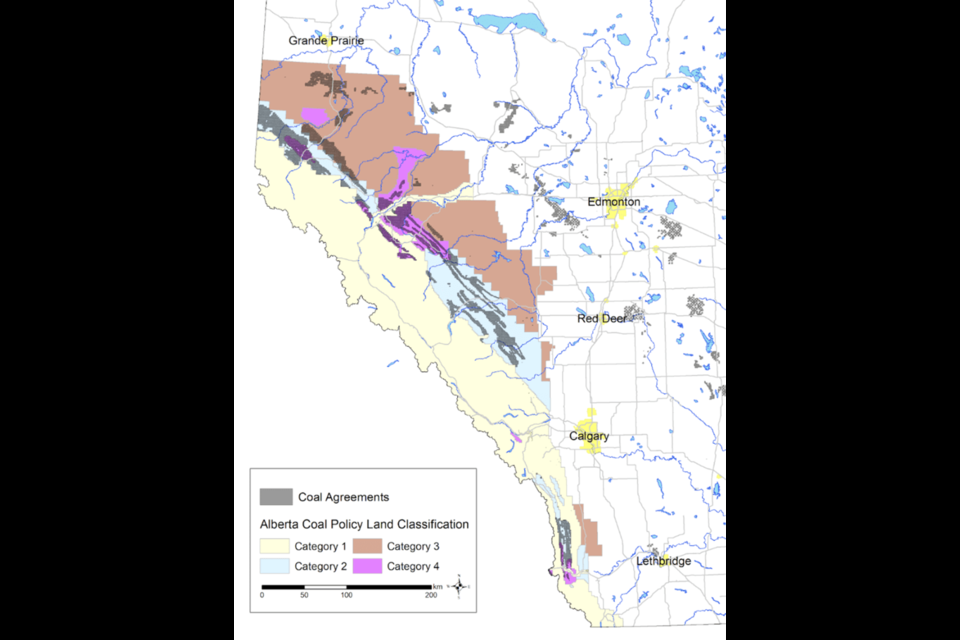EDMONTON – Alberta’s leader of the opposition has introduced a private member’s bill with the aim of curtailing coal mining on the eastern slopes along the Rocky Mountains.
Notley introduced the bill – The Eastern Slopes Protection Act – at the legislative assembly Wednesday afternoon (April 7). If passed, it would immediately cancel coal exploration activities such as road building and test pits along the eastern slopes, cancel existing coal leases on some lands, and prohibit coal mining on other areas.
The proposed act would also stop the Alberta Energy Regulator from issuing approvals in some areas and cancel leases approved since the UCP government rescinded the 1976 Coal Development Policy last spring.
“Albertans have been very clear. They want mountains, not mines. They want clean water,” Notley said.
She noted existing mines and mining operations would not be impacted, by the proposed act.
NDP environment critic Marlin Schmidt first announced the intention of introducing a private member’s bill in late March. During a March 31 virtual meeting with the Bow Valley Chamber of Commerce, Rachel Notley reiterated her party’s intention of doing so.
The proposed act has a number of hurdles to go through before being considered an approved law.
It first has to go through the Private Bills and Private Member’s Public Bills Committee. It consists of 11 members – seven from the UCP and four from the NDP – and its next meeting is April 19.
Notley highlighted no proposed bill from the NDP has made it out of the committee, which was established by Premier Jason Kenney after he was elected.
If it makes it through the committee, it would return to the legislature and have to go through three readings and a committee of the whole before achieving royal assent.
“It is, in essence, a replication or continuation of the Lougheed Policy, along with the natural extension of applying more science, more engagement, more consultation in an evidence-based way around significant development in very delicate watersheds,” Notley said.
“There is good reason for them to support it. So, it's not just about politics. It is about giving this government the opportunity to make the right choice.”
If passed, it would likely mean some type of compensation would go to cancelling leases that have gone forward when the coal policy was rescinded.
Notley said it was difficult to give potential figures it could cost the province since not all of the information is public.
“It's not as publicly disclosed as it should be. However, what we are saying and what this legislation says is that the compensation would be done in line with what's already in place in terms of the mines and minerals,” she said.
“The framework for that compensation is not the same as what you would see in commercial law where you're suing for lost economic opportunity or anything like that ... you're just getting the money back because the lease costs.”
The Lougheed Coal Policy established provincial legislation when it came to the Rocky Mountains. After taking two years to develop, it stopped coal surface mines in roughly 1.4 million hectares of wilderness.
The policy created four categories with a set of rules for coal mining. Category 1, which includes the Bow Valley, was forbidden and spanned about 700 kilometres. Category 2 – mostly west of Red Deer and west of Lethbridge – restricted open-pit mines.
Category 3 and 4 had fewer restrictions and were primarily in the plains areas to the west of Edmonton and south of Grande Prairie.
Premier Jason Kenney rescinded the policy last May without public consultation, calling it a “dead letter” and an intense public pushback began. Several environment groups, First Nations and ranchers threatened or took the province to court and the UCP ultimately reinstated the original policy in February.
Energy Minister Sonya Savage has said there will be widespread public consultation and announced at the end of March a five-person committee to consult with the public on coal mining in the province.
A public survey was launched and is open until April 19.
“The consultation will be rigorous, it will be lengthy, it will hear the input of all Albertans on all views related to coal,” she said in February.
Notley criticized the survey – calling it “threadbare" – specifically on the lack of mention of water quality and water quantity.
The Coal Association of Canada – based in Edmonton – was not immediately available. The Outlook will update this story as new information becomes available.
What The Eastern Slopes Protection Act proposes
- Stop all exploration activities such as road building and test pits along the eastern slopes
- Permanently prohibit new coal mining and related activities in Category 1 and 2 lands and cancel existing leases in those areas
- Prohibit coal mining and related activities in Category 3 and 4 until a thorough regional plan is developed after public consultation
- Stop he Alberta Energy Regulator from issuing approvals – including for water – in Category 3 and 4 lands and cancel leases dating back to May 2020
The four categories from the Lougheed Coal Policy
- Category 1: National parks, current or proposed provincial parks, wilderness areas, designated recreation areas and wildlife sanctuaries
- Category 2: Parts of the southern Rocky Mountains and Foothills
- Category 3: Northern forested region and eastern portions of the eastern slopes
- Category 4: Areas in Alberta not covered by the other three categories




